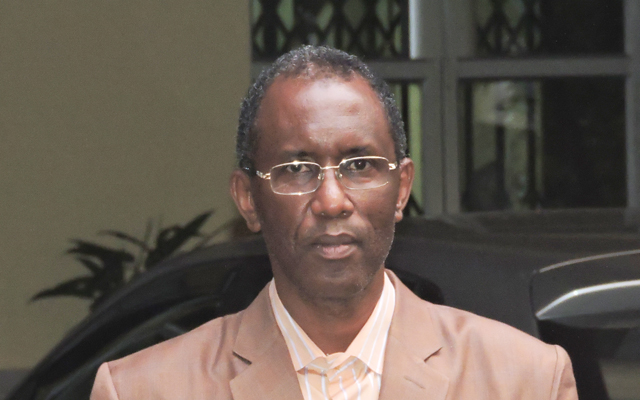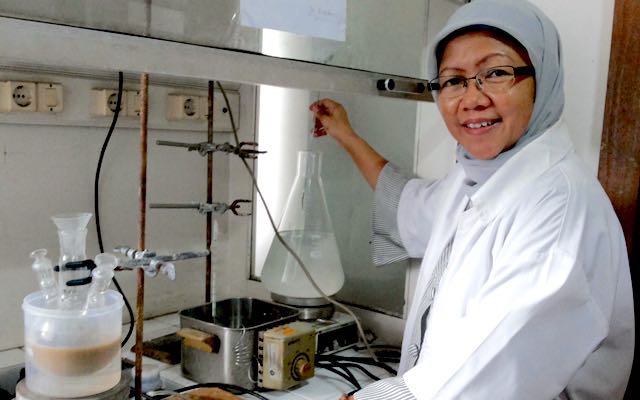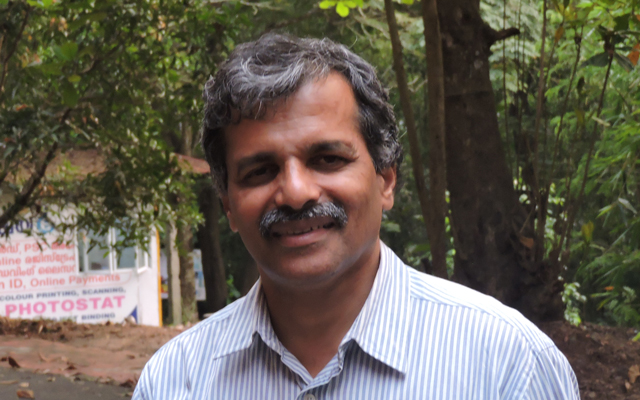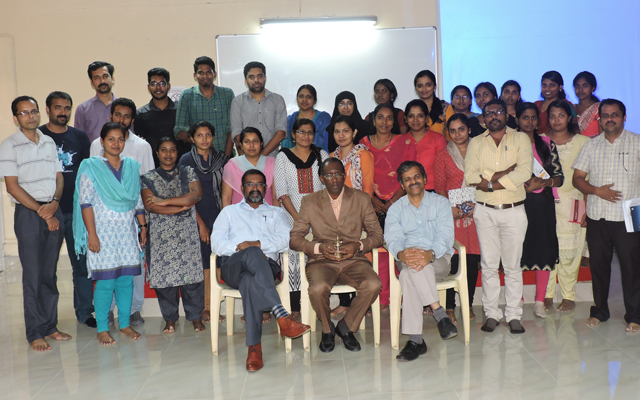Life can change unexpectedly around a cup of coffee. This is just what happened during an international meeting that TWAS organized to celebrate the recipients of its Research Grants programme and their scientific achievements.
Coffee breaks, in fact, were auspicious for Modou Fall, Myrtha Karina and Sabu Thomas. They met for the first time during the Research Grants Conference – Shaping Careers in Science held in Trieste, Italy, where TWAS has its headquarters.
There, they put forth the idea of scientific collaborations. Both Karina and Fall agreed to spend some time in professor Thomas' laboratory, to learn cutting-edge techniques not available in their countries. The aim was to apply them back home to help local science and economic development.
"Professor Thomas listened to me introducing myself in Trieste: he seemed immediately very attracted by my research on corrosion," said Fall, a chemistry professor at Cheikh Anta Diop University in Dakar, Senegal. Fall won TWAS research grants in 1996, 2004, 2007 and 2016, for projects aimed at devising energy storage, environmental remediation and anti-corrosion coating materials.
Thomas himself is a TWAS research grant recipient. He mixes polymers – large molecules made of repeated units – with other substances to prepare new materials with innovative features. For his research, he earned TWAS grants in 1995 and 2002. The awards allowed him to set up his laboratory, recruit students for his research team and publish scientific papers.
Now Thomas is the director of the International and Inter University Center for Nanoscience and Nanotechnology, Mahatma Gandhi University (MGU), in Kottayam, India, and he has been recently appointed pro vice chancellor of MGU. "We have ambitious scientific projects," he explained. "And the collaborations with TWAS grantees will help increase our ranking."
Karina, a principal investigator in the research unit for clean technology at the Indonesian Institute of Sciences in Jakarta, received grants in 1998, 2000, 2009 and 2012. "With professor Thomas, we agreed to create research collaboration because we have similar research topics on cellulose," she said in a recent interview. And she added: "We also agreed that I will send my young students to carry out research work at his laboratory, aiming at having several international publications as our output targets."
A history of impact
The TWAS Research Grants scheme was established in 1986, to help talented young scientists from developing countries. Now, after more than 30 years, some 2,530 grants have been distributed in support of projects in biology, chemistry, mathematics and physics.
The Swedish International Development Cooperation Agency (Sida) has long provided essential financial support for the main TWAS Research Grants programme in basic sciences (biology, chemistry, mathematics, physics).
An additional research grants programme, inclusive of other scientific fields, was set up with support from the Italian Government through the Ministry of Foreign Affairs and International Cooperation and the Organization of Islamic Cooperation's Standing Committee on Scientific and Technological Cooperation (COMSTECH) in Pakistan.
The grants are typically USD15,000 for individual scientists and USD30,000 for groups, and allow the purchase of laboratory equipment, chemicals and consumables, along with publication of scientific papers, conference participation and books.
Projects are carried out by individuals and groups in the 66 S&T-lagging countries that TWAS has identified on the basis of their low-income levels and specific needs for support in building research capacity. They are also distributed to young scientists from countries in the Organization of Islamic Cooperation (for the COMSTECH grants).
For scientists from developing countries, even a modest grant can help get a research project off the ground. "The awards I have received from TWAS have dramatically changed my career," said Myrtha Karina. For example, she said, her 2013 grant propelled her to present her results at the International Society for Biomedical Polymers and Polymeric Biomaterials in Washington, D.C.
After the grant, "I became trusted to lead an internal research group," she explained. "I was appointed to lead one division in my research institute and was asked to supervise students. Invitations as a keynote speaker in scientific meetings came as well."
Advancing science, building careers
Without such research support, researchers in the developing world may be unable to pursue their projects. As Fall acknowledged: "The grants I have been awarded during the last decade were certainly the most important ones. After these grants I became full professor and that was a big step forward in my career."
And the latest TWAS grant he has received is serving him well again. "Thanks to the latest award, I have been able to recruit ten MS students supported by the TWAS grant and to advertise this possibility through the website."
Fall, Karina and Thomas first met in 2016, at a TWAS conference that for the first time convened past grant recipients spanning many years. The event drew more than 45 grantees from 26 nations – including Sudan, Mali, Senegal, Nigeria, Chile, Argentina, Sri Lanka, Uzbekistan and Nepal. Each showcased the high-level results of their research; each came with a personal successful story to tell; and many left with new potential research partners and projects.
More about the impact of TWAS Research Grants is showcased in a movie directed by filmmaker Nicole Leghissa
"Meeting Modou Fall in Trieste was a very positive event," recalled Thomas. "Fall works in an innovative field, and we are investigating together: he studies paints and resins with self-healing properties, which heal cracks under pressure or temperature variations."
These so-called bio-nanocomposites are molecules in the range of 1-1000 nanometres. (For comparison, a human hair is about 75,000 nanometres, and a strand of DNA is about 2.5 nanometres.) These composites can be used in water purification, in the aerospace sector and in many other applications.
However, Fall's studies now focus mainly on corrosion, because it is a critical problem in Senegal where the coastal salt permeates everything. The local atmosphere is corrosive due to salt microparticles floating over long distances. Infrastructures and home devices are damaged, and one of Fall's major goals is to contain the effects of corrosion on metals and steel.
Supporting sustainable development
Karina's field of investigation is likewise concrete. She is a principal investigator in the research unit for clean technology at the Indonesian Institute for Sciences (LIPI) in Jakarta, supervising 22 researchers. Her research is focused mainly on cellulose, the most common organic polymer on earth, used mainly as raw material for papermaking.
Unfortunately, she explained, the production of cellulose derivatives is harmful to the environment. The bleaching processes required for the purification of cellulose from lignin (a component of plants' cell walls) produces toxic liquid waste. That's why Karina is trying to understand the properties of the chemical bonds linking cellulose and lignin, in order to attain the production of a purer kind of paper without using bleaching processes. Recently, she started a study on a pure form of bacterial cellulose, where some bacterial strains give a final product with a high degree of purity.
In addition, her group has started collaboration with a company that produces biodegradable plastic shopping bags. They have already registered a patent entitled “Biocellulose-based edible film.”
Karina and Thomas haven't started their joint project yet – in fact, they have just submitted their proposal to TWAS. If it's accepted, Karina will send one of her researchers to Thomas' lab in India to proceed with cellulose studies.
Fall is already in India, engaging in two different projects: innovative polymer coatings that offer stronger-than-ever protection against corrosion, and the investigation of how steels used in Senegal suffer from atmospheric corrosion. Analyses will be carried out through scanning electron microscopy, a technique that is not available in Senegal.
"We expect promising results and we think that a corrosion division might be implemented here," Fall maintains. But there is more to this partnership: Thomas and Fall plan to establish an official cooperation based on common projects and an exchange of students.
As Fall explained: "One of my former students will also be here [in India] in April 2018. He will spend six months under professor Thomas's guidance. And we have in mind to invite professor Thomas in Senegal, to give seminars. Probably the Visiting Scientist programme of TWAS will be explored to this purpose."
The story is far from over. As Sabu Thomas explains, several joint projects between India and Senegal are already in the pipeline, and the climate for further partnership is promising. "We plan to establish both a student- and a faculty-exchange programme to carry out thorough analyses and move along with more joint projects," he said. In addition, Thomas is hoping to organize an international conference with Fall and to edit a book on topics of common interest.
Every important journey starts with the first step. For professors Fall, Thomas and Karina, the first step was a TWAS research grant.
Cristina Serra

